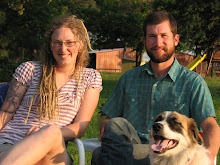Bread and Wine, Body and Blood.
Christ's passion begins in the garden.
Here, for the first time, He does not want to be alone with God and seeks protection among his friends. Protection from whom? "Remove this cup from me," spare me this suffering- what suffering? His passion begins here where His request is not heard, His prayer not answered but by divine silence. There, alone, while his friends sleep, He begins His suffering- suffering from God.
Of course there was the simple human fear of pain, but I believe a quite different fear also laid hold of His soul: the fear that He, the only begotten, could be "forsaken" and "rejected" by the Father. He was not afraid for his life, he was afraid for God. The real torment in Christ's passion, the cup which He was not spared, is the godforsakenness, beginning with the terrible silence in response to his prayer in the garden. And His friends were protected from it by a profound sleep.
He departs with the despairing cry, "My God, my God, why has thou forsaken me?" At the center of the Christian faith is the history of Christ's passion. At the center of this passion is the experience of the godforsaken, God cursed Christ. We shall never get used to this fact, that at the center of all we hear this cry of the godforsaken Christ for God.
Is this the end of all human and religious hope? Or is it the beginning of the true hope which is born again and can no longer be shaken? For me, true hope. Here lies the beginning of life which has death behind it and, therefore, for which death can no longer be feared. At the point where we lose hope and can do nothing more, the lonely, assailed and forsaken Christ waits for us and gives us a share in his holy passion. Our disappointments, our loneliness, our defeats do not separate us from Him; they draw us more deeply into communion with Him. What joy, what hope! Out of our tears, our waiting, our agonized darkness, out of our weeping and wondering, out of our cry, "Why, my God? Why?" He enters, giving us Himself. Not a placebo or good advice, but Himself. Would we rather have our own dry eyes, or His tear-filled ones?
It is here, in our own Gethsemane of spiritual and emotional darkness, where we find the deepest communion with Christ, for it is here where we share in His sufferings, where we must partake of the holy broken body and spilled out blood of Christ. He, only He, can suffice our need. When we join in His death cry, we await with Him our own resurrection. And it is then that we can use our own brokenness as nourishment for others. We are, after all, the body of Christ. This is our true communion for which there is great reason to hope.
shalom

I love what you said about us sharing in Christ's sufferings. It reminds me that the Bible does not tell us why we suffer. It only models through Jesus how we should go about suffering. Thanks for sharing.
ReplyDelete